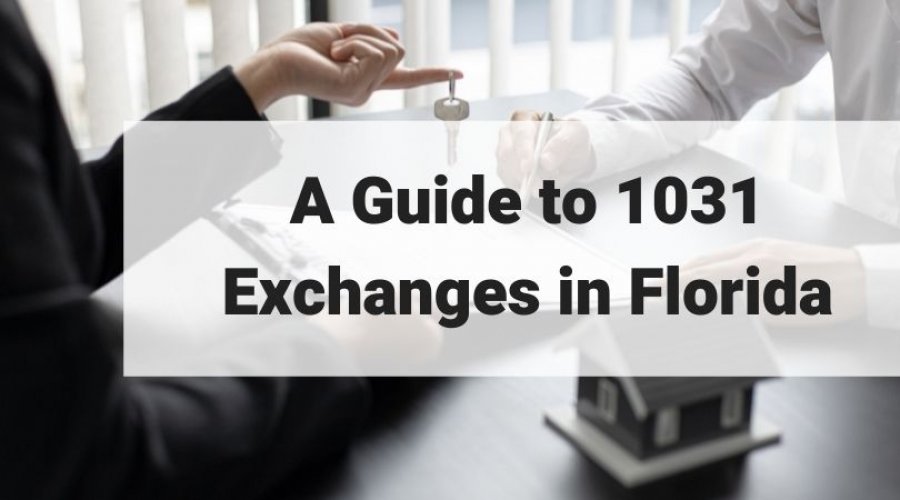
A 1031 Exchange gets its name from Section 1031 of the U.S. Internal Revenue Code. If you abide by all its requirements, you may be able to defer taxes on capital gains almost indefinitely.
Is there a cap on how many exchanges you can do under a 1031 Exchange in Florida? Absolutely not! You can do as many as you want. Consequently, you may be able to build significant wealth quickly.
For a 1031 Exchange to be successful, an investor will need to follow certain rules. The following are answers to commonly asked questions regarding 1031 Exchanges in Florida.
What Kinds of Properties Qualify for a 1031 Exchange?
Not all types of properties can qualify under the 1031 Exchange program. Your primary residence, for instance, won’t qualify. That’s because properties under the program must be held as an investment or for business use.
The following are examples of properties that may qualify for a 1031 Exchange in the state of Florida:
- Exchanging raw land for improved real estate
- Exchanging a ranch for oil and gas royalties
- Swapping a real property for a residential one
Properties that may be ineligible include stock in trade or other property held primarily for sale. (IRC §1031).
What Are the Timelines and Rules Required for a Successful 1031 Exchange?
Traditionally, an exchange involves a swap of one property for another between two parties. However, the odds of finding someone with the exact property you’re looking for are slim. As such, a significant number of exchanges tend to be delayed exchanges.

In a delayed exchange, a qualified intermediary is necessary. A qualified intermediary is someone whose role is to hold the cash acquired after selling the property. They will then use the cash to buy the replacement property on your behalf.
You must observe two important timelines when performing a delayed exchange:
45-Days Rule
You’ll have 45 days to designate replacement property. When your property sells, your intermediary will be the one receiving the cash. If you receive the cash, the exchange will be disqualified.
In addition, you must designate the replacement property to the intermediary within the same period, specifying the property you wish to buy. This must be in writing.
As per the Internal Revenue Service, you can choose from up to three properties. However, you’ll be able to close on only one.
180-Day Rule
This is the second timeline that you’ll have to adhere to when performing a delayed exchange. Once you have closed on your old property, you’ll have 180 days to close on the new property.
Please note that the two time periods run concurrently. You should start counting once your old property closes. So, suppose you designate a replacement property 45 days later. In such a case, you’ll have 135 days remaining to close on it.
The other type of 1031 Exchange is a reverse exchange. This is the opposite of a delayed exchange. Here, you’ll need to buy the replacement property prior to selling the old one. Still, the same time limits – 45 days and 180 days – apply.

The transfer must be done to an exchange accommodation titleholder, the property identification done within 45 days, and the transaction completed within 180 days since the replacement property was bought.
Who Exactly Is a Qualified Intermediary?
Under the IRS, using a qualified intermediary is a prerequisite to carrying out a 1031 Exchange. When exchanging a like-kind property, you don’t receive the proceeds of the sale directly. Rather, you must sell the property through a qualified intermediary.
The intermediary will then sell the property on your behalf and keep the funds acquired from the sale. If you receive the proceeds from the sale directly, you’ll have to pay capital gains taxes on that amount.
Once the sale is completed, the intermediary will hold the funds in an escrow account. They will then later use those funds to buy the replacement property.
Other things a qualified intermediary can help with include:
- Ensuring an exchange complies with all rules and regulations set forth by the IRS
- Receiving and holding information regarding any specified properties
- Providing instructions and documents regarding the exchange for the escrow or title company
- Preparing documentation and legal agreements required for a successful structuring of a 1031 exchange
A qualified intermediary can be a real estate agent, an investment broker, a CPA, an attorney, or an employee.
What Is Boot and How Can It Occur?
Boot refers to non-like-kind property received in an exchange. It can take the form of debt relief, an installment note, cash, or even personal property.

While receipt of boot doesn’t qualify a 1031 exchange, it introduces a taxable gain into the transaction. In other words, the transaction becomes partial rather than a fully taxed deferred exchange.
The following are some examples of boot:
- Property that you intend to use for personal use
- Property that isn’t like-kind
- Debt relief on a relinquished property
- Non-qualified property, such as notes, bonds, stocks, or partnership interests
- Cash proceeds you may have received, for any reason, at the closing of the replacement property
The following are a few simple rules to follow in a 1031 Exchange in order to avoid boot:
- Bring some cash to closing to take care of items that may be considered non-like-kind. For instance, outstanding vendor invoices, tenant deposits, and rent prorations
- Don’t over-finance the mortgage on the replacement property. If you do, it would create boot
- Include personal property such as appliances in the purchase price. Alternatively, handle them in separate transactions
- Increase or maintain the debt amount on the replacement property
- Reinvest all proceeds from the 1031 exchange into the replacement property
- Trade up in real estate value with at least one replacement property
Bottom Line
As a savvy real estate investor, you may be able to build wealth through a tax-deferred strategy. That said, 1031 Exchanges involve a lot of complex moving parts and enlisting a professional is advisable. Consider hiring an expert property management company like State Property Management to help with the process!